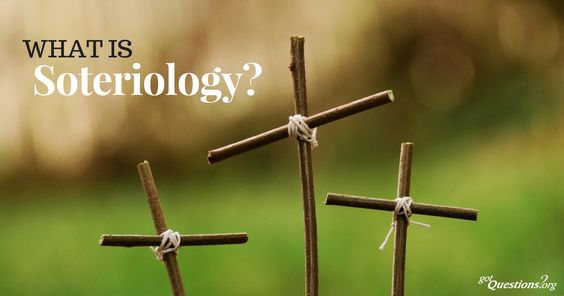SOTERIOLOGY MINUS JESUS [I]

I) The kernel of soteriology finds seminality in the kerygma. The soteriology, solely an establishment of the Divinity, finds the solidity of its foundation in the kerygma, such that as the proclamation of the truth gets trumpeted, it uncovers the apocalypse of the mind and act of the Lord God, the Almighty. What is the definition of soteriology? It is: “The branch of Christian theology that deals with salvation as the effect of a divine agency.” Soteriology is solely a preserve of Jehovah’s workability.
The facticity of baraminology fingers an irrevocability of creationism. In the hands of the Adamic blunder, baraminic haecceity suffered a defeat, causing the baramic Designer to a further establishment of the soteriological reality, aimed at the redemption of the lost souls of Adam that would walk the humble path of the parabolic son of prodigence. Is the Christ the divine Author of creationism? He must of necessity be the One and the only Founder of the salvific Providence: for, forsooth, Jesus Christ is the Creator of all things –visible and invisible.

“And he is before all things, and by him all things consist” [Colossians 1:17]
“For by him were all things created, that are in heaven, and that are in earth, visible and invisible, whether they be thrones, or dominions, or principalities, or powers: all things were created by him, and for him: 17) And he is before all things, and by him all things consist” [Colossians 1:16-17]. The word ‘created’ is the Greek ktizo (ktiy’-zō): ‘to fabricate, i.e. found (form originally).’ Ktizo, ergo, theologically understood –very similar to Hebraic bara meaning ‘creation ex nihilo i.e. out of nothing’—, makes Jesus the originator of creationism. ‘Consist,’ sunistao (sïn-iy-staō’), συνιστάνω sunistano (sïn-iy-sta’-nō) [strengthened] or συνίστημι sunistemi (sïn-iy’-stee-miy) [also] in Greek means: ‘1. to set together. 2. (by implication) to introduce (favorably). 3. (figuratively) to exhibit. 4. (intransitively) to stand near. 5. (figuratively) to constitute.

“All things were made by him” [John 1:3]
There is not a smidgeon of doubt that the Original Creator should be the One who should have the capability of the Divinity to set the entire creation glued together. The Bible says in John 1:3-4, “All things were made by him; and without him was not any thing made that was made. 4) In him was life; and the life was the light of men.” Ginomai (ǰiy’-no-mai) is the Greek for ‘made,’ meaning: ‘1. to cause to be (“gen”-erate). 2. (reflexively) to become (come into being). 3. (of events) to happen.’ The verb ‘without,’ choris (chō-riys’), means: ‘at a space, i.e. separately or apart from (often as preposition).’ And ‘life’ is zoe (zō-ee’): ‘1. life†. (more than merely the present physical or natural life). 2. life-above. (above or elevated in relation to the mere physical condition. There may be strong connotations and direct inferences to Spiritual, Kingdom, or Eternal life in certain contexts, but not always. This word deserves special demarcation and attention).’

In the Book of John 15:5, Jesus taught the factuality of His divinity. “I am the vine, ye are the branches: He that abideth in me, and I in him, the same bringeth forth much fruit: for without me ye can do nothing.” This scripture takes us back to Exodus 25:8, where Jehovah made the Mosaic covenant, “And let them make me a sanctuary; that I may dwell among them.” Jesus is actually enabling a divine reassurance of Old Testamentary asseveration. Jesus is the only One needed to actuate soteriology, or else He would not have employed the use of the verb ‘abideth,’ meno (me’-nō), defined as ‘1. to remain. 2. (in a place) to abide, to stay. 3. (of expectancy) to await. 4. (in a state) to continue. 5. (in a task) to endure. 6. (of a relationship) to exist permanently in, inseparably united (inhere, adhere). The adverb ‘without’ is choris (chō-riys’): ‘at a space, i.e. separately or apart from (often as preposition).’

Get born again. Say this simple prayer, believing it with all your heart. Say:
“Dear heavenly Father, I come to You now in the name of Jesus Christ. I believe in my heart that Jesus is the Son of God. I believe that Jesus died on the cross for my sin. I believe that You raised Him from the dead. I confess with my mouth that Jesus is Lord and I receive Him now as my Lord and my Saviour. I give God all the glory. Amen!”
(…to be continued…)
To read part two, click here
Visits: 170


